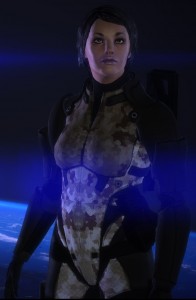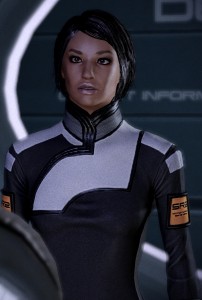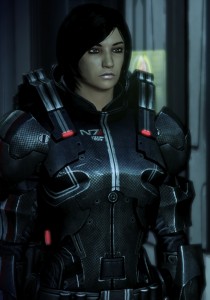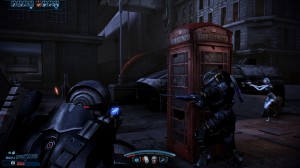I picked up Mass Effect: Legendary Edition when it turned up in the Humble Monthly bundle, and I’ve been happily pottering through the trilogy for the last couple of months. The overhaul of the first game made it eminently playable for something 15 years old, though it still has a few rough edges; the combat is a little clunky, a lot of side missions occur in strangely similar rooms, and driving around planets in the Mako hasn’t magically transformed into a wildly exciting experience.
There are mods aplenty for the Legendary Edition and in hindsight I wish I’d installed some for the first game, particularly the ability to continuously run rather than getting puffed out after jogging for 30 seconds (come on, Shepard, you need to hit the gym a bit more) and skipping the decryption minigame (interesting a few times, pretty tedious towards the end). I thought I’d just stick with the main story and whip through things to remind myself of how it all started, but some inner compulsion (noble work ethic or masochistic streak of self-loathing?) drove me to every last planet in the galaxy; I might’ve missed out on a few grams of beryllium here and there but cleared up almost everything that showed up in the mission journal. I remembered a few of the main story beats (unlike Mass Effect: Andromeda, which I more or less forgot even existed, let alone anything of the plot or characters) but fair swathes had faded from my memory. I had a vague recollection of a slow start, and was slightly surprised by how quickly the main party assembled; a few key planets and one existential threat to the galaxy later, it was off to the second game.
The improvement in combat in Mass Effect 2 was particularly noticeable following immediately on, everything flows a little more smoothly. I remembered a little more of the story as well, what with the story essentially being “recruit a whole bunch of people and sort out their problems before finally tackling the galaxy-threatening menace”. There were chunks of content completely new to me, though, with the Legendary Edition including all DLC. The first game only had one pack that was included in the original PC version anyway, the second had a fair few more and I’d only played the free stuff included at launch (back in those heady days when I actually bought games as they were released rather than finally getting round to them a few years later). It was nice to catch up again with Liara properly in the Lair of the Shadow Broker, but I didn’t feel like I’d missed out on too much back in the day without the DLC. The hover-tank felt particularly extraneous; granted it was better than the Mako but that’s such a low bar to clear that hovering was hardly necessary. I also installed mods to skip the decryption mini-game and planet-scanning (having done it all manually the first time around I had no desire to stare at spectrograph readings again), and most importantly to allow female Shepard to get to know Jack much better.
On to the third game, and combat is polished that little bit more to the point that it could carry the multiplayer mode. That’s not in the Legendary Edition, a bit of a shame in some ways but there’s hardly a shortage of alternative multiplayer looter-shooters, and the maps pop up as missions in the single player game. They probably gave me the strongest flashbacks – I’d played through the story once but roamed each multiplayer map for tens, if not hundreds, of rounds of horde-type skirmishing and I’d recall a certain favourite console that offered good lines of sight on one map, a route to an extraction point via convenient ladder on another.
Again there’s plenty of DLC that I didn’t have first time around, so far I’ve played through Omega, which was a nicely self-contained story. I have slightly bogged down in the middle of the game, though, I’m not feeling terribly driven to push on through. Something I rather miss is the ability to take a completely different class out for a spin; in multiplayer you could flip between a melee-heavy biotic and sneaky sniper as the mood took you, in single player (barring a fair amount of faff with respeccing and/or mods) I settle into much more of a groove, which does get a bit samey after a while. I also wonder if the ending has something to do with it. First time around I was aware of the General Miffedness of a bunch of folk but managed to avoid specifics, so with expectations suitably lowered I didn’t find the ending that bad. Not particularly good, but not garment-rendingly awful. This time, knowing what’s coming, a lot of the schlepping around the galaxy to gather resources feels a bit pointless, but having ticked off all the side missions in the first two games I’m not going to stop now.
I’m mixing it up with my previously outlined regulars, and was almost tempted to add another to the mix when the Epic Store gave away a bunch of loot for Shop Titans. I installed it to see what was what, and it was fun enough to craft things to sell to level up to craft better things to sell for more to level up further to craft even better things to sell for even more to level up to… well, you get the idea. When you get to level 15 it may suddenly unlock a new mode that deconstructs the very nature of reality but I rather suspect not. It was fun enough but I haven’t really got time for any more virtual admin, and the “over $100!” value of the giveaway was hardly encouraging – a few chests and random virtual currencies would cost that much? Getting on for twice the full price of Mass Effect? Madness.



